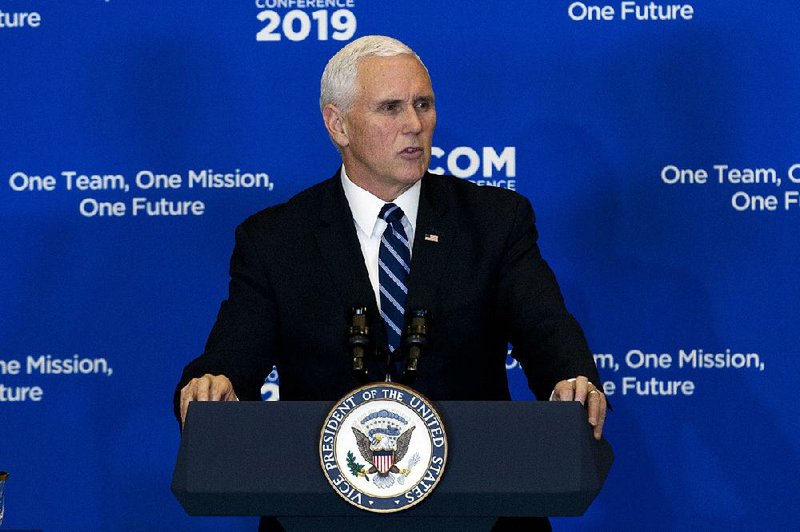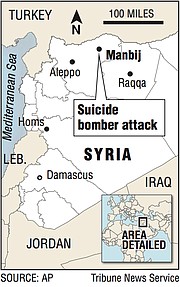BEIRUT -- Two U.S. service members and two American civilians were among those killed Wednesday in an explosion in Syria, the U.S. military said, an attack that came less than a month after President Donald Trump announced his intention to withdraw troops from the war-torn country.
The Islamic State militant group claimed responsibility for the morning attack, which local groups said killed 16 people in the U.S.-patrolled town of Manbij.
The attack called into question Trump's claim that the Islamic State has been defeated in Syria -- his stated reason for pulling 2,000 American troops out of the country.
The attack targeted a restaurant in the northern city of Manbij where U.S. soldiers would sometimes stop to eat during their patrols of the area, residents said. After the blast, a number of Americans were evacuated by helicopter, they said. It was not immediately clear how many had been in the area at the time of the blast.
The Britain-based Syrian Observatory for Human Rights, a war-monitoring group, said 16 people were killed, including nine civilians, and that others were wounded in Wednesday's blast. It added that at least five U.S.-backed Syrian fighters were among the dead.
Video released by local activists and news agencies showed a restaurant with extensive damage and a street covered with debris and blood. Several cars also were damaged.
A security camera showed a busy street, then a ball of fire engulfing people and others running for cover as the blast went off.
A statement from the Islamic State, released through its Amaq news agency, said the suicide attacker blew up his explosive vest to target a patrol of coalition soldiers and local militiamen near the Qasr al-Umara restaurant in Manbij. It claimed that the attack killed or wounded nine Americans and a number of residents.
A statement by U.S. Central Command said the explosion happened while the troops were "conducting a local engagement."
According to a U.S. official, one of the American civilians killed in the attack was an intelligence specialist working for the Defense Intelligence Agency. The other was a contractor who was serving as an interpreter.
Sarah Huckabee Sanders, the White House spokesman, said Trump had been briefed on the attack, "and we will continue to monitor the ongoing situation in Syria."
The bombing puts Trump in the position of being squeezed between his decision to withdraw U.S. troops and his promise in a tweet Sunday to hit the Islamic State again, and "hard," if the group lashed out.
In announcing his intention to bring back U.S. troops, the president tweeted in December that "We have defeated ISIS in Syria, my only reason for being there during the Trump Presidency."
Vice President Mike Pence repeated the claim Wednesday, saying the Islamic State "caliphate has crumbled" and that the militant network "has been defeated." His comments in a speech at the State Department came shortly after the U.S. military announced that American soldiers were among those killed in Manbij.
Pence maintained that plans to pull troops out of Syria remain on track, though he also pledged that the U.S. would "stay in the fight to ensure that ISIS does not rear its ugly head again."
PULLOUT OPPOSITION
The U.S. has about 2,000 soldiers in Syria who were sent to work with local militias in 2015 to fight the Islamic State militants. Wednesday's attack prompted calls from Republicans and Democrats in Congress for Trump to reconsider his decision to withdraw troops.
Sen. Lindsey Graham, R-S.C., a Trump ally who has criticized the Syria withdrawal plan, suggested the president's stance emboldened Islamic State fighters and encouraged such attacks.
Trump's statements "set in motion enthusiasm by the enemy we're fighting" and "make people we're trying to help wonder about us, and as [the militants] get bolder, the people we're trying to help are going to get more uncertain," Graham said at a Senate Judiciary Committee hearing. "I saw this in Iraq. And I'm now seeing it in Syria."
Trump, however, reinforced his withdrawal decision during a meeting with about a half-dozen GOP senators late Wednesday at the White House.
Sen. Rand Paul of Kentucky, who was at the meeting, told reporters on a conference call that the president remained "steadfast" in his decision not to stay in Syria -- or Afghanistan -- "forever." But the senator did not disclose the latest thinking on the withdrawal timeline.
Trump's shifting timetable for pulling U.S. troops out of Syria, a country he described as "sand and death," has left allies and other players in the region confused and jockeying for influence over a withdrawal strategy that appeared to be a work in progress.
Critics have said a pullout was premature, that the Islamic State was still not defeated and that a withdrawal could lead to a power vacuum that would fuel even more violence. It also led to the resignation of Defense Secretary James Mattis.
Since then, U.S. officials and Trump have suggested the withdrawal would be slower than initially believed. Mattis signed the formal order to begin the military withdrawal before he left the Pentagon at the year's end. But last week, John Bolton, the White House national security adviser, said two conditions would have to be met: the protection of the U.S.' Kurdish allies in northern Syria, and the total defeat of the Islamic State.
Last week, the U.S. military began removing equipment from northeast Syria into neighboring Iraq. No troops are known to have withdrawn yet.
Manbij is a highly strategic area: It is the main town on the westernmost edge of Syrian territory held by the U.S.-backed Syrian Kurds, running along the border with Turkey. Mixed Kurdish-Arab Syrian forces liberated Manbij from the rule of the Islamic State in 2016 with help from the U.S.-led coalition. But Kurdish control of the town infuriated Turkey, which views the U.S.' main Kurdish ally, the People's Protection Units, as "terrorists" linked to Kurdish insurgents on its own soil.
The town has been at the center of tensions in northern Syria, with the militaries of two NATO members, the U.S. and Turkey, on opposing sides.
The two sides began joint patrols around Manbij in November as part of an agreement for easing tensions between the two allies.
Before Wednesday's attack, two U.S. troops had been killed in Syria since the first contingent of Special Operation forces entered the country in 2015.
In March, Master Sgt. Jonathan Dunbar, an Army commando, was killed by a roadside bomb near Manbij. In 2016, Senior Chief Petty Officer Scott Cooper Dayton, a bomb-disposal technician, died in a roadside blast near the town of Ayn Issa.
Information for this article was contributed by Bassem Mroue, Deb Riechmann, Lisa Mascaro and Lolita C. Baldor of The Associated Press; and by Eric Schmitt and Ben Hubbard of The New York Times.
A Section on 01/17/2019

